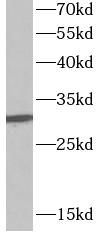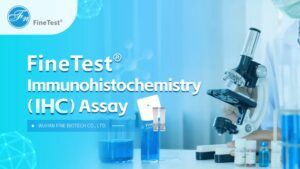Products
SFN antibody
Category:
Research Area:
- SPECIFICATIONS
- Product Name
- SFN antibody
- Catalogue No.
- FNab09897
- Size
- 100μg
- Form
- liquid
- Purification
- Immunogen affinity purified
- Purity
- ≥95% as determined by SDS-PAGE
- Clonality
- polyclonal
- Isotype
- IgG
- Storage
- PBS with 0.02% sodium azide and 50% glycerol pH 7.3, -20℃ for 12 months(Avoid repeated freeze / thaw cycles.)
Immunogen
- Immunogen
- 14-3-3 protein sigma
- Alternative Names
- 14 3 3 protein sigma antibody, HME1 antibody, SFN antibody, stratifin antibody, YWHAS antibody
- UniProt ID
- P31947
- Observed MW
- 31 kDa
Application
- Tested Applications
- ELISA, WB, IHC, IF
- Recommended dilution
- WB: 1:500 - 1:2000; IHC: 1:50 - 1:200; IF: 1:50 - 1:100
Validated Images
 MCF-7 cells were subjected to SDS PAGE followed by western blot with FNab09897( SFN antibody) at dilution of 1:1000
MCF-7 cells were subjected to SDS PAGE followed by western blot with FNab09897( SFN antibody) at dilution of 1:1000
 Immunohistochemistry of paraffin-embedded rat liver tissue slide using FNab09897( SFN antibody) at dilution of 1:100
Immunohistochemistry of paraffin-embedded rat liver tissue slide using FNab09897( SFN antibody) at dilution of 1:100
- Background
- 14-3-3 proteins regulate many cellular processes relevant to cancer biology, notably apoptosis, mitogenic signaling and cell-cycle checkpoints. Seven isoforms, denoted 14-3-3 b, g, e, z, h, q and s, comprise this family of signaling intermediates. 14-3-3 s, also known as SFN, stratifin, HME1 or YWHAS, is a secreted adaptor protein that is involved in regulating both general and specific signaling pathways. Expressed predominately in stratified squamous keratinising epithelium, 14-3-3 s is able to bind and modify the activity of a large number of proteins, such as KRT17 (Keratin 17), through recognition of a phosphothreonine or phosphoserine motif. When bound to Keratin 17, for example, 14-3-3 s acts to stimulate the Akt/mTOR signaling pathway by upregulating protein synthesis and cell growth. 14-3-3 s also functions to positively mediate IGF-I-induced cell cycle progression and can bind to a variety of translation initiation factors, thus controlling mitotic translation. In response to tumor growth, 14-3-3 s positively regulates the tumor suppressor p53 and increases the rate of p53-regulated inhibition of G2/M cell cycle progression. Multiple isoforms of 14-3-3 s exist due to alternative splicing events.



